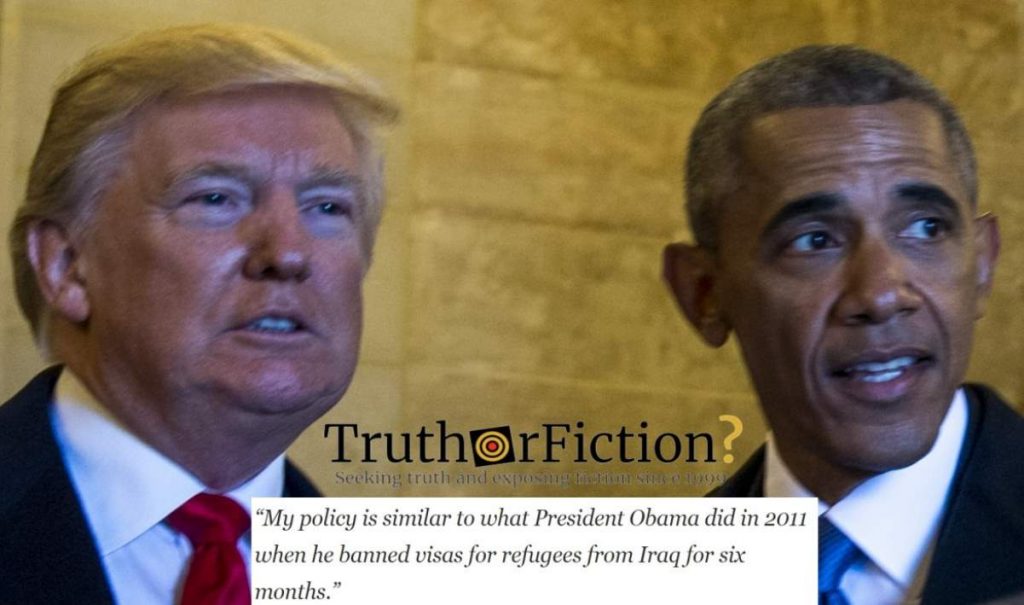In an attempt to justify his own anti-Muslim policies in early 2017, then-U.S. President Donald Trump went back to the familiar tactic of claiming that it was no different than a directive from his predecessor Barack Obama’s administration.
In defending Executive Order 13769, which quickly became known as Trump’s “Muslim ban” for prohibiting entry into the U.S. from seven majority-Muslim countries — Iraq, Iran, Libya, Somalia, Yemen, Sudan and Syria — Trump said, “My policy is similar to what President Obama did in 2011 when he banned visas for refugees from Iraq for six months.”
As has frequently been the case, Trump was pushing false information.
In this instance, Trump was referencing a six-month decrease in the resettlement of Iraqi refugees to the United States. As Eric Paul Schwartz, who worked as Assistant Secretary of State for Population, Refugees, and Migration during Obama’s presidency, told the Washington Post:
President Obama never imposed a six-month ban on Iraqi processing. For several months in 2011, there was a lower level of Iraqi resettlement, as the government implemented certain security enhancements. Indeed, as we identified new and valuable opportunities to enhance screening, we did so. Nobody should object to a continual effort to identify legitimate enhancements, but it is disreputable to use that as a pretext to effectively shut down a program that is overwhelmingly safe and has enabled the United States to exercise world leadership. In any event, there was never a point during that period in which Iraqi resettlement was stopped, or banned.
That six-month shift was enacted in response to the indictment of two Iraqi nationals, 30-year-old Waad Ramadan Alwan and 23-year-old Mohanad Shareef Hammadi, on terrorism-related charges after Alwan was identified as the person who built an improvised bomb used to attack U.S. troops in his native country in 2005. The Justice Department later said that both Hammadi and Alwan also attempted “to ship money and weapons from the United States to insurgents in Iraq.”
The two men did not initially move to the United States via a refugee assistance program, however; their entry came via the Special Immigrant Visas for Iraqis program (SIV), which had been established three years before in order to benefit Iraqi nationals who helped U.S. troops as interpreters or with other means of support.
As an analysis of the program by the Congressional Research Service found, participants in this program could not be identified as refugees under the rules set by the Immigration and Nationality Act (INA):
As defined in the INA, a refugee is a person who is unwilling or unable to return to his or her home country “because of persecution or a well-founded fear of persecution on account of race, religion, nationality, membership in a particular social group, or political opinion.” Refugees accepted for admission to the United States can be accompanied by their spouses and children. The admissions process for refugees is separate from and different than the process for immigrants. After one year in refugee status, they are required to apply to adjust to [lawful permanent resident] status. By contrast, special immigrants, like immigrants generally, are granted LPR status upon admission to the United States.
According to the Washington Post:
The arrests caused an uproar in Congress, and the Obama administration pledged to reexamine the records of 58,000 Iraqis who had been settled in the United States. The administration also imposed new, more extensive background checks on Iraqi refugees. Media reports at the time focused on how the new screening procedures had delayed visa approvals, even as the United States was preparing to end its involvement in the Iraq War.
In January 2013, Hammadi was sentenced to life in prison, while Alwan was sentenced to 40 years in prison “followed by a life term of supervised release.”
By comparison, Trump’s order completely barred any refugee entry into the U.S. by Syrian residents “indefinitely,” and for 120 days from the other six nations listed. The move touched off a series of legal battles that spanned half of Trump’s presidency, until the Supreme Court upheld a later iteration of the ban in June 2018 — which restricted entry from not only the seven original countries affected but also Venezuela and North Korean government officials.
Trump would go on to lose the 2020 presidential election to Obama’s Vice-President, Joe Biden (despite Trump’s years of insisting otherwise). Upon his inauguration, Biden overturned Trump’s order.
Update 6/20/2023, 3:50 p.m. PST: This article has been revamped and updated. You can review the original here. — ag
- Trump's Refugee Order Not Same as Obama's in 2011
- ACLU Washington - Timeline of the Muslim Ban
- Trump's Facile Claim That His Refugee Policy is Similar to Obama's in 2011
- Former Iraqi Terrorists Living in Kentucky Sentenced for Terrorist Activities
- Two Iraqi Nationals Indicted on Federal Terrorism Charges in Kentucky
- U.S. Department of State - Special Immigrant Visas for Iraqis - Who Were Employed by/on Behalf of the U.S. Government
- Congressional Research Service - Iraqi and Afghan Special Immigrant Visa Programs
- In Big Win For White House, Supreme Court Upholds President Trump's Travel Ban
- Proclamation on Ending Discriminatory Bans on Entry to The United States

